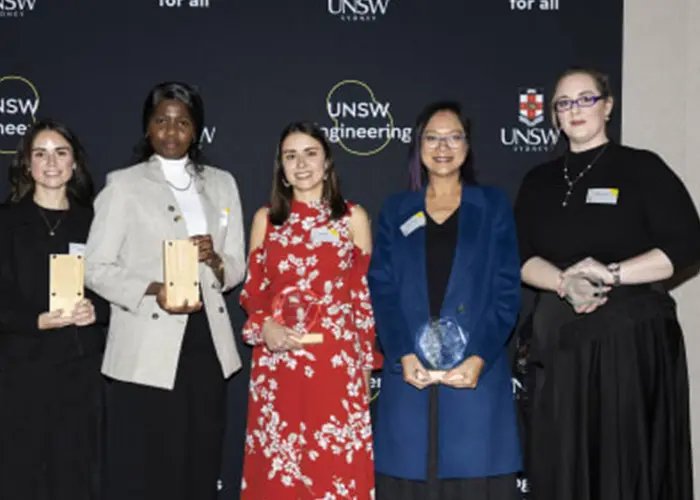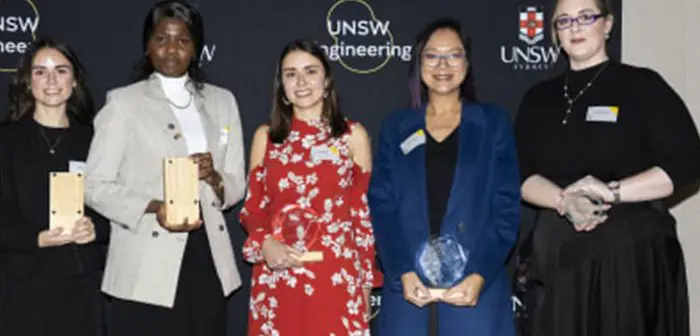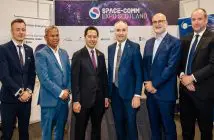
Rebecca Cook, Ground Terminal and Infrastructure Manager at Northrop Grumman Space Systems, is the UNSW Women in Engineering Ada Lovelace Medal for Outstanding Engineer winner for 2025.
Her prize was one of four presented at a ceremony for the UNSW Women in Engineering Alumni Awards, which are designed to recognise the amazing achievements of women engineers who are mentoring, providing inspiration and impact, and being role models for the next generation.
The Ada Lovelace medal was created by UNSW Engineering, in 2016 and is named for Augusta Ada Byron, later Countess Ada Lovelace, an English mathematician who is widely regarded to be the first computer programmer for her work on Charles Babbage’s revolutionary mechanical general-purpose computer, the Analytical Engine.
Previous winners of the award include Mary O’Kane (NSW Chief Scientist & Engineer), Kathryn Fagg (board member of the Reserve Bank and Boral), and Judy Raper (chemical engineer and former senior official in the U.S. National Science Foundation).
Cook serves as a system specialist with Northrop Grumman in support of critical space programs for both USA and Australia, and is passionate about mentoring the next generation.
She was born and raised near Chicago, Illinois, and developed a passion for math and science after being inspired by her father, an electrical engineer.
Cook joined the US Air Force at the age of 17 to help fund her education and was trained in combat communication systems. After active duty, she transitioned into defence contracting, working in the Republic of Korea for five years before relocating to Australia – where she has lived and worked for over a decade.
“Receiving the Ada Lovelace Medal is something I never could have expected,” said Cook. “Working in intelligence and defence, you are trained to stay quiet, do the work and move on without public acknowledgement or even explanation. So being recognised here feels both strange and meaningful.
“I’ve had the privilege of working with people all over the world, each with different ways of thinking, solving, and leading. I learned early on that if you listen carefully, everyone can teach you something, even if it’s what not to do.
“I’ve worked to set an example for those around me, and hopefully my efforts result in positive change and can leave doors open for everyone of any age and gender to follow. I don’t love talking about myself, but I believe in doing good work, in building trust and in helping others find their footing in a space that can be intimidating.
“If this award helps shine a light on that kind of leadership, then I’m proud to accept it.”
The UNSW Women in Engineering Alumni Awards event also saw Lucy Marshall and Grace Chung share the Judy Raper Award for Leadership.
Marshall is the Deputy Vice Chancellor (Community and Leadership) at the University of Sydney. In this role she leads the strategic direction for culture, leadership, and diversity, equity, and inclusion initiatives across the university.
Previously, Professor Marshall served as Executive Dean of the Faculty of Science and Engineering at Macquarie University and her extensive leadership experience includes key roles at UNSW, where she was the academic lead for the Athena SWAN program promoting gender equity in academia.
An accomplished researcher, with expertise in environmental modelling and simulation, Professor Marshall also has extensive experience in driving cross-institutional initiatives that enhance the student experience and maximise research impact.
Prof. Marshall was unable to attend the ceremony in person, but said in a video message: “I am deeply honoured to receive the Judy Raper Award for Leadership from the university that has shaped so much of my life — first as a student, and later as a professor.
“I believe UNSW Engineering is a rare kind of place: one that sees the potential in people, and then invests in that potential. As a woman in engineering, I can say with absolute certainty that being in an environment where women’s leadership is expected, is nurtured and even celebrated has made all the difference. I carry that legacy into every role I’ve taken on since, and I try to pay it forward wherever I can.
“I’m also incredibly proud of the work the university continues to do in championing women in engineering more broadly. It’s not just about individual careers — it’s about shifting the culture, and I’m grateful to have been part of that journey.”
Sharing the Judy Raper Award for Leadership is Dr Grace Chung, the Engineering Director of Google Research Australia.
Dr Chung has a track record in building strong engineering teams and spearheading major advancements in key products like ChromeOS, Chrome and Search. Her expertise prior to Google includes foundational research in speech recognition, natural language processing, and machine learning.
Dr Chung was a Fulbright Scholar and holds a PhD in Computer Science from Massachusetts Institute of Technology, while also being a professional jazz vocalist in her spare time.
“Back in 1990 I had absolutely no idea what electrical engineering was, or what an electrical engineer did day-to- day, and I had no idea what the course in engineering would involve. But I closed my eyes, and I dove right into it,” Dr Chung said in her acceptance speech.
“I feel like it’s a big responsibility for me to be standing up here and championing the retention women, to encourage them to stay in this field.
“For women to be doing technical work moving forward, and not quitting, is so important. I feel it is part of my responsibility to to encourage women to stay.
“I love the technical work, but I also discovered that I like working with people. I discovered how to work with people, and I discovered I really like it. I love mentoring and nurturing junior engineers, putting teams together and creating an amplifying impact through those teams.”
Inspiring women engineers
The Maria Skyllas-Kazacos Young Professional Award for Outstanding Achievement was presented to Deniz Emul, Senior Biocompatibility Engineer at ResMed.
Emul is an emerging leader in medical device toxicology and biocompatibility, whose role at ResMed involves leading pivotal regulatory submissions and developing innovative tools to streamline biocompatibility assessments.
She is also a passionate advocate for STEM outreach, co-founding Resmed STEM and inspiring future scientists. Her efforts reflect both scientific excellence and dedication to advancing safer, more effective medical technologies.
“I’m honored to be here tonight and thank those who have supported my journey so far,” she said.
“Engineering often works quietly in the background of our daily lives, from the technology that we use and rely on, to the infrastructure that keeps our communities running. It’s in the clean water that we drink, the phones we carry, and in the way that we access and experience healthcare at its best.
“Engineering is about empathy. It’s about understanding how people live and designing systems, tools and technologies that support these lives in meaningful and often unseen ways.
“I feel incredibly fortunate to be part of a field where the smallest improvement can make a genuine difference, and I hope we continue to make that difference collectively. I hope that this is only the beginning.”
The Inspiring Student Award was co-presented by Dean of Engineering Professor Julien Epps and The Hon. Dr Sarah Kaine, Chair of the Legislative Council Standing Committee on Social Issues in the Parliament of NSW.
This award was also shared, with Keira Moran and Nomathemba Ndlovu named as joint winners.
Moran is currently studying for a double degree in Mechanical Engineering and Biomedical Engineering at UNSW, and was nominated for her involvement in the Assistive Tech Hub, helping to develop a communication device for children with disabilities in the Solomon Islands.
She is a proud Yuin woman and a passionate advocate for Indigenous representation in STEM. She is involved in initiatives such as Tiddas in Tech and CSIRO’s Indigenous Women in STEM Academy, reflecting her strong commitment to driving progress, equity, and culturally informed innovation in engineering.
Ndlovu is studying for a Master of Engineering (Renewable Energy) degree at UNSW, having previously been awarded an Australia Awards scholarship to advance her engineering expertise.
She is passionate about providing sustainable energy solutions for underserved communities and has contributed to transformative community initiatives spanning Africa, Asia, Pacific, and Australia.
Ndlovu has contributed to community projects working with Engineers Without Borders in Timor-Leste, while also mentoring local women to extend the impact of her engineering via skills transference and empowerment. In addition, as Technology Director for the Youth Climate Policy Centre, she has contributed innovative policy recommendations for energy transition and youth-led climate action.
The UNSW Women in Engineering Alumni Awards are part of an ongoing commitment by UNSW’s Faculty of Engineering, by far the nation’s largest, to attract more women to the profession.
Prof. Epps, Dean of UNSW Engineering, said: “I warmly congratulate all the winners for their outstanding achievements and inspiring leadership.
“I know there were many strong nominations across all the categories and having joint prizes for some of them proves how hard it was for the judges to select a winner.
“The dedication and excellence which is clear to see, not only highlights the incredible talent among women, non-binary and gender diverse students, alumni, and industry leaders but also hopefully paves the way for a more diverse and inclusive engineering community.”
Professor Rita Henderson, Deputy Dean (Societal Impact and Translation) at UNSW’s Faculty of Engineering, and a member of the selection committee, added: “These awards are a celebration of inspirational role models, whether they’re current students, alumni, or future leaders.
“We are delighted to be able to shine a spotlight on such incredible individuals and trust their achievements can motivate the next generation to step confidently into engineering, which is a field that is still largely male-dominated.
“UNSW is genuinely committed to making sure that women, non-binary and gender diverse people are provided equitable opportunities to grow and thrive in their engineering careers; this is not only a moral imperative, but will help ensure the industry benefits from diverse perspectives and talents.”
Image: Award-winners Keira Moran, Nomathemba Ndlovu, Deniz Emul, Grace Chung and Rebecca Cook at the 2025 UNSW Women in Engineering Alumni Awards. Image by Ken Leanfore – Credit: UNSW





